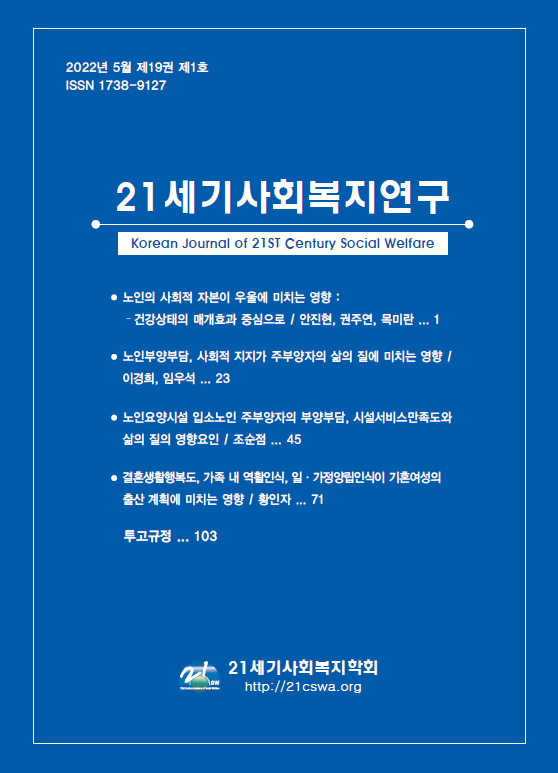노인의 사회적 자본이 우울에 미치는 영향 – 건강상태의 매개 효과 중심으로 -
The Effects of Social Capital on Depression in the Elderly – Focusing on the mediating effect of health Status -
- 21세기사회복지학회
- 21세기사회복지연구
- 제19권 제1호
-
2022.051 - 21 (21 pages)
- 110

본 연구는 노인의 사회적 자본과 우울 간의 관계를 살펴보고, 이러한 관계에서 건강상태의 매개 효과 규명을 목적으로 한다. 연구방법은 한국고용정보원 고령화 연구패널 (KLoSA) 8차(2020년) 조사에서 65세 이상 노인 4,372명을 대상으로 하였다. 자료 분석은 SPSS 22.0버전으로 Baron & Kenny(1986)가 제안한 3단계 절차로 매개모형을 검증하였다. 연구결과는 다음과 같다. 첫째, 노인의 사회적 자본에서 친구 자본, 사회활동 자본은 우울에 유의한 부적인 영향을 미치며, 자녀 자본은 유의한 영향을 미치지 않은 것으로 나타났다. 둘째, 노인의 사회적 자본은 건강상태에 정적인 영향을 미치는 것으로 나타났다. 셋째, 노인의 건강상태는 우울에 유의한 부적 영향을 미치는 것으로 나타났다. 넷째, 노인의 사회적 자본과 우울의 관계에서 건강상태는 유의한 매개역할을 하는 것으로 나타났다. 본 연구결과를 토대로 하여 노인 우울 감소를 위한 사회적 자본과 건강상태의 향상을 위한 실천방안을 제시하였다.
This study aims to examine the relationship between social capital and depression of the elderly and to investigate the mediating effect of health status in the relationship between social capital and depression. The subjects of the study were 4,372 elderly people in the 8th (2020) survey of the Korea Employment Information Service's Aging Research Panel (KLoSA). Data analysis verified the mediating model with a three-step procedure proposed by Baron & Kenny (1986) with SPSS version 22.0. The results of the study are as follows. First, it was found that in the social capital of the elderly, friend capital and social activity capital had a significant negative effect on depression, and child capital did not have a significant effect. Second, in the social capital of the elderly, child capital, friend capital, and social activity capital were found to have a significant positive effect on health status. Third, the health status of the elderly has a significant negative effect on depression, Fourth, it was found that health status played a significant mediating role in the relationship between social capital and depression of the elderly. In conclusion, based on the results of this study, practical measures for improving social capital and health status for reducing depression in the elderly were presented.
Ⅰ. 서론
Ⅱ. 이론적 배경
Ⅲ. 연구방법
Ⅳ. 연구결과
Ⅳ. 결론
참고문헌
(0)
(0)